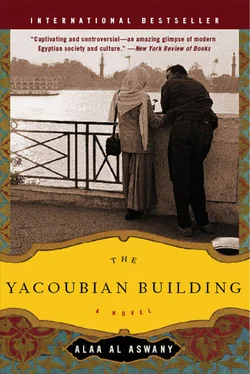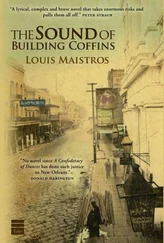Alaa Al Aswany - The Yacoubian Building
Здесь есть возможность читать онлайн «Alaa Al Aswany - The Yacoubian Building» весь текст электронной книги совершенно бесплатно (целиком полную версию без сокращений). В некоторых случаях можно слушать аудио, скачать через торрент в формате fb2 и присутствует краткое содержание. Год выпуска: 2006, ISBN: 2006, Издательство: Adobe Acrobat eBook Reader, Жанр: Современная проза, на английском языке. Описание произведения, (предисловие) а так же отзывы посетителей доступны на портале библиотеки ЛибКат.
- Название:The Yacoubian Building
- Автор:
- Издательство:Adobe Acrobat eBook Reader
- Жанр:
- Год:2006
- ISBN:978-0-06-087813-9
- Рейтинг книги:5 / 5. Голосов: 1
-
Избранное:Добавить в избранное
- Отзывы:
-
Ваша оценка:
- 100
- 1
- 2
- 3
- 4
- 5
The Yacoubian Building: краткое содержание, описание и аннотация
Предлагаем к чтению аннотацию, описание, краткое содержание или предисловие (зависит от того, что написал сам автор книги «The Yacoubian Building»). Если вы не нашли необходимую информацию о книге — напишите в комментариях, мы постараемся отыскать её.
The Yacoubian Building — читать онлайн бесплатно полную книгу (весь текст) целиком
Ниже представлен текст книги, разбитый по страницам. Система сохранения места последней прочитанной страницы, позволяет с удобством читать онлайн бесплатно книгу «The Yacoubian Building», без необходимости каждый раз заново искать на чём Вы остановились. Поставьте закладку, и сможете в любой момент перейти на страницу, на которой закончили чтение.
Интервал:
Закладка:
The truth of the matter is that Basyouni, the photographer in Ataba Square, can run anyone up a newspaper piece talking of his skill for any newspaper on demand — ten pounds for Arabic and twenty for foreign. It takes Basyouni no more than the name of the newspaper and a picture of the client plus a ready-made article that he has in which the writer speaks of his great surprise at coming across in the streets of Cairo the workshop of the brilliant tailor so and so, or the establishment of the great kebab cook so and so. All of these Basyouni puts together in a certain way in the photocopier so as to make the copy come out looking as though it has been taken from the newspaper.
But what does Malak do in his new place? He makes shirts, of course; but tailoring doesn’t account for more than a small part of his daily activities because, in short, he works at anything that might yield a profit, from trading in currency and smuggled liquor to brokering real estate, land, and furnished apartments, to arranging the marriage of elderly Arabs to young peasant girls whom he brings in from certain villages in Giza and Fayoum, to sending workers to the Gulf against two months’ wages.
This multifaceted enterprise has made him avid for any information he can get about people and for knowledge of their most minute secrets, since anyone is a potential candidate to have dealings with him at any moment, and a little bit of information may help him at any given instant and have a decisive impact on those dealings, allowing him to sew things up the way he wants. Every day from mid-morning to ten at night, every type of humanity makes its way to Malak’s workplace — poor customers and rich, elderly Arabs, brokers, maids and girls for the furnished apartments, and small traders and commission agents; and in the midst of all these Malak comes and goes, talking and shouting, laughing and wheedling, losing his temper and quarreling, swearing a hundred false oaths and making deals, like a well-known and illustrious actor performing with relish his role in a play he has rehearsed so long he has perfected it.

Malak used to see Busayna el Sayed twice a day, on her way to and from work. She had stirred his interest from the beginning because she was beautiful and her body arousing. At the same time another feeling that was difficult to put into words made him certain that the serious expression that she wore on her face was fragile and false and that she was not as virtuous as she tried to appear. When he had collected some information about her and knew everything that was going on, he started greeting her and asking her about the health of her mother the Hagga and whether the Shanan clothing store in which she worked was in need of a consignment of shirts (for which she would of course get her commission), and gradually he started talking to her about a variety of subjects — the weather, the neighbors, marriage. Busayna herself was both ill at ease with Malak and at the same time unable to keep him at a distance since she passed him every day and he was their neighbor and spoke to her politely, thus denying her the opportunity of rounding on him. All the same, she submitted to conversing with him at base because something searching and probing in his behavior toward her made her submit. No matter what topic he might be speaking to her about, the tone of his voice and his looks would get to her, as though he were saying, “Don’t come on so self-righteous. I’ve found out everything.” This unspoken message became so clear and strong that she started asking herself whether Talal could have revealed the secret of their relationship.
Malak got more and more familiar with her until one day he suddenly directed a slow, appraising look at her full bosom and luscious body and then asked brazenly, “How much does Talal Shanan pay you a month?”
Suddenly she felt furious and decided that this time she would put him in his place very firmly, but in the end she found herself answering, avoiding his eyes, “Two hundred and fifty pounds.”
Her voice came out with a strange-sounding rattle as though someone else were speaking and Malak laughed, came close to her, and said, advancing his attack, “You’re a stupid girl. That’s pennies. Listen, I can get you work for six hundred pounds a month. Don’t say anything now. Take your time to think about it — a day, two days, then come and see me.”

2

At Maxim’s, Zaki el Dessouki feels at home. No sooner has he crossed Suleiman Basha Square to the small passage opposite the Automobile Club, pushed open the small wooden door with the glass panes, and passed through the entranceway, than he feels as though a magic time machine has carried him back to the beautiful years of the 1950s. Everything at Maxim’s — from the brightly painted white walls hung with original works by great artists, the quiet lighting emanating from elegant wall lamps, the tables covered with gleaming white cloths on which plates, folded napkins, spoons, knives, and glasses of various sizes are set out in the French manner, and the way into the bathroom that is concealed from sight by a large blue folding screen to the small, chic bar at the far end to the left of which stands an ancient piano on which Christine, the restaurant’s owner, plays for her friends — bears the stamp of the elegant past in the same way as do old Rolls-Royces, ladies’ long white gloves, hats decorated with feathers, gramophones with horns and gold needles, and old black-and-white photos in wooden frames that we hang in the sitting room and forget about and which, when from time to time we do look at them, make us feel tender and melancholy. The owner of Maxim’s, Madame Christine Nicholas, is of Greek origin, born and raised in Egypt. She draws, plays the piano and violin excellently, and sings exquisitely. She has married a number of times and lived a gay and boisterous life. Her relationship with Zaki began in the 1950s with a passionate love that burned itself out and left behind a deep, unbudgeable friendship. Zaki will be preoccupied and go without seeing her for many months, but as soon as he feels oppressed or things are not going well for him, he goes to her and always finds her waiting for him. She listens attentively, gives him sincere advice, and commiserates like a mother.
Today, no sooner did she see him entering through the door of the bar than she let out a cry of joy and embraced him and kissed him on both cheeks. Then she took his hands, leaned back, and examined him for a short while with her blue eyes, saying, “You look worried, my friend.”
Zaki smiled sadly and almost said something but remained silent. Christine shook her head as though she understood, then invited him to sit at his favorite table next to the piano and ordered a bottle of rose and cold hors d’œuvres . Just as dried flowers retain something of their old fragrance, Christine still bore traces of her former beauty. Her body was neat and svelte, her hair dyed and swept back, and tasteful makeup gave her lined face a dignified, refined cast. When she laughed, her face would fluctuate between the tenderness and tolerance of a kindly grandmother and that old coquetry that would sometimes return in a momentary flash, then disappear. Christine tasted the wine as the traditions of the table require, then made a sign to the ancient Nubian waiter and he poured out two full glasses. As he sipped the wine, Zaki told her what had happened. She listened attentively, then said dismissively, pronouncing the French words in her own specially smooth and musical way, “Zaki, you’re exaggerating. It’s just an ordinary quarrel.”
Читать дальшеИнтервал:
Закладка:
Похожие книги на «The Yacoubian Building»
Представляем Вашему вниманию похожие книги на «The Yacoubian Building» списком для выбора. Мы отобрали схожую по названию и смыслу литературу в надежде предоставить читателям больше вариантов отыскать новые, интересные, ещё непрочитанные произведения.
Обсуждение, отзывы о книге «The Yacoubian Building» и просто собственные мнения читателей. Оставьте ваши комментарии, напишите, что Вы думаете о произведении, его смысле или главных героях. Укажите что конкретно понравилось, а что нет, и почему Вы так считаете.












